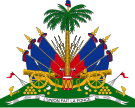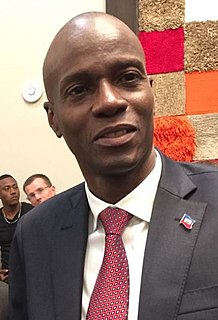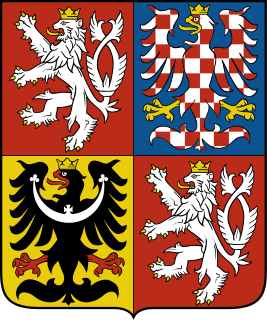| ||
| This article is part of a series on the |
| Politics of Haiti |
|---|
 |
Legislature |
Executive |
Judiciary |
Recent elections |
| Foreign relations |
Senate elections for a third of the seats in the Senate of Haiti were held on 19 April 2009 (they were scheduled for March or April 2008, but were postponed), with a run-off to be held on 21 June 2009. [1] [2] [3] Per the Constitution of Haiti, voters should renew ten of the thirty seats in the Senate, but as Pierre Emmanuel Limage (representing Fwon Lespwa, the party of President René Préval, for Artibonite), died in a car accident and Ultimo Compère (representing Fwon Lespwa for Centre; his term would have expired in 2008 regularly) and Rudolph H. Boulos (representing the Fusion of Haitian Social Democrats for Nord-Est) resigned, there will be twelve open seats instead. [4]

The Constitution of Haiti was modeled after the constitutions of the United States and France. The document was approved by Parliament in March 2011 and came into effect on June 20, 2012.
Fwon Lespwa was a Haitian political coalition headed by René Préval, who served as president from 1996 to 2001 and from 2006 to 2011. The name Lespwa is the Haitian Creole form of the French l'espoir, meaning "hope". The coalition's full French name is Front de l'Espoir. Lespwa includes many members and former members of the last democratically elected government of Jean Bertrand Aristide and his Fanmi Lavalas.

The President of Haiti, officially called the President of the Republic of Haiti is the head of state of Haiti. Executive power in Haiti is divided between the president and the government headed by the Prime Minister of Haiti. The current president is Jovenel Moïse, who took office on February 7, 2017.
Contents
The seats for which elections will be held are divided among parties as follows:
- Fwon Lespwa – 4 (two of them currently vacant)
- Fusion of Haitian Social Democrats – 2 (one of them currently vacant)
- Struggling People's Organization – 2
- L'Artibonite in Action – 1
- Pont – 1
- Fanmi Lavalas – 1
- Christian National Union for the Reconstruction of Haiti – 1

The Fusion of Haitian Social Democrats —also translated in some sources as Union of Haitian Social Democrats— is a political party in Haiti.

The Struggling People's Organization, called until 1996 Lavalas Political Organization, is a Haitian political party originating from the Lavalas political movement. Formed in 1995, the more conservative Lavalas split from the party in 1996 forming their own Fanmi Lavalas party, at this time the OPL's name was changed from Organisation Politique Lavalas to its present appellation. This split meant that few of the intelligentsia that had previously supported Aristide ended up in the new Lavalas.
Pont is a political party in Haiti. Jean Marie Chérestal, Prime Minister from 2 March 2001 to 21 January 2002, was the leader of the party. The party won in the 7 February 2006 Senate elections 1.1% of the popular vote and two Senators. In the 7 February and 21 April 2006 Chamber of Deputies elections, the party won no seats.
Preparations were finished in late May 2008.[ citation needed ]
40 candidates were not allowed to contest the election, including Guy Philippe and all 17 from Aristide's Fanmi Lavalas, reportedly due to procedural mistakes and missing signatures or possibly even two lists of candidates submitted in some constituencies. 79 candidates were approved. [5] The disqualification was strongly criticised by local and international organisations alike, with some even claiming that the elections were not really democratic. Turnout was very low. [6] A majority for president Préval's Fwon Lespwa party could aid him in amending the constitution to increase the president's power and allowing a second consecutive term. [7] [8] Run-off elections were expected for many seats due to the high number of candidates.

Guy Philippe was a Haitian death squad leader and has attempted to become a political leader. He led the 2000-2004 paramilitary insurgency that culminated in the U.S. government's 2004 Haitian coup d'état ousting of Haiti's elected government and President Jean-Bertrand Aristide.

Fanmi Lavalas, is a social-democratic political party in Haiti. Its leader is former Haitian President Jean-Bertrand Aristide. It has been a powerful force in Haitian politics since 1991. Fanmi Lavalas governments advocate a policy of "growth with equity" based on Caribbean and Western European social democratic principles. Fanmi Lavalas governments have emphasised investment in education and health care as their priorities and have refused International Monetary Fund austerity measures.
Voting for Ultimo Compère's vacant seat in the Centre department had to be rescheduled after voters ransacked polling places and a poll supervisor was shot in Mirebalais. Results took a few days, as they were all be tabulated in Port-au-Prince and therefore all ballots had to arrive there before they can be counted. [9] None of the candidates in any of the departments managed to get more than half of the votes in the first round, so the two candidates in each departments were set to face each other in a run-off on 7 June 2009. [10] Turnout for the first round was around 11%. [11] The run-off was on 13 May 2009 announced to have been postponed to 21 June 2009, due to legal problems with election challenges; by that date, no date had been set for the re-run of the election in the Centre department. [3]

Mirebalais is a commune in the Centre department of Haiti, approximately 60 km northeast of Port-au-Prince on National Road 3. The city was established in 1702.

Port-au-Prince is the capital and most populous city of Haiti. The city's population was estimated at 987,310 in 2015 with the metropolitan area estimated at a population of 2,618,894. The metropolitan area is defined by the IHSI as including the communes of Port-au-Prince, Delmas, Cite Soleil, Tabarre, Carrefour, and Pétion-Ville.
According to final results including annulment of illegal votes, the following parties had candidates in the run-off: [12]
- Fwon Lespwa (LESPWA) – 8 candidates
- Struggling People's Organization (OPL) – 5 candidates
- Fusion of Haitian Social Democrats (FUSION) – 3 candidates
- L'Artibonite in Action (AAA) – 2 candidates
- Christian National Union for the Reconstruction of Haiti (UNION) – 1 candidate
- independent – 1 candidate
- Working Together for Haiti (KONBA) – 1 candidate
- Union of Haitian Citizens for Democracy, Development and Education (UCADDE) – 1 candidate
In the second round, LESPWA won five seats, and five parties won one seat each (OPL, AAA, FUSION, KONBA, UCADDE), as well as an independent.
| Parties | 1st round | 2nd round | ||||
|---|---|---|---|---|---|---|
| Votes | % | Candidates in the run-off | Votes | % | Seats | |
| Fwon Lespwa (LESPWA) | 131,647 | 29.68% | 8 (of 10) | 178,482 | 43.22% | 5 |
| Struggling People's Organization (OPL) | 90,549 | 20.41% | 5 (of 8) | 85,834 | 20.79% | 1 |
| Fusion of Haitian Social Democrats (FUSION) | 34,191 | 7.71% | 3 (of 7) | 41,621 | 10.08% | 1 |
| L'Artibonite in Action (AAA) | 44,896 | 10.12% | 2 (of 6) | 37,188 | 9.01% | 1 |
| Union of Haitian Citizens for Democracy, Development and Education (UCADDE) | 14,806 | 3.34% | 1 (of 2) | 16,943 | 4.10% | 1 |
| Independents | 23,254 | 5.24% | 1 (of 8) | 16,643 | 4.03% | 1 |
| Working Together for Haiti (KONBA) | 18,751 | 4.23% | 1 (of 4) | 15,909 | 3.85% | 1 |
| Christian National Union for the Reconstruction of Haiti (UNION) | 30,205 | 6.81% | 1 (of 10) | 14,499 | 3.51% | 0 |
| Respect (RESPE) | 12,976 | 2.93% | 0 (of 2) | |||
| Democratic Movement for the Liberation of Haiti–Revolutionary Party of Haiti (MODELH–PRDH) | 11,024 | 2.49% | 0 (of 2) | |||
| Independent Movement for National Reconciliation (MIRN) | 7,794 | 1.76% | 0 (of 2) | |||
| Rally of Progressive National Democrats (RNDP) | 7,382 | 1.66% | 0 (of 3) | |||
| National Unity Party (PUN) | 4,481 | 1.01% | 0 (of 2) | |||
| Social Renewal Party (PSR) | 2,461 | 0.56% | 0 (of 2) | |||
| Movement for the Installation of Democracy in Haïti (MIDH) | 1,931 | 0.44% | 0 (of 1) | |||
| Popular Agreement Party (PEP) | 937 | 0.21% | 0 (of 1) | |||
| For Us All (PONT) | 160 | 0.04% | 0 (of 1) | |||
| No candidate | 6,171 | 1.39% | — | 5,841 | 1.41% | — |
| Total | 443,616 | 100.00 | 22 | 412,960 | 100.00 | 11 |
| Sources: CEP, CEP | ||||||






